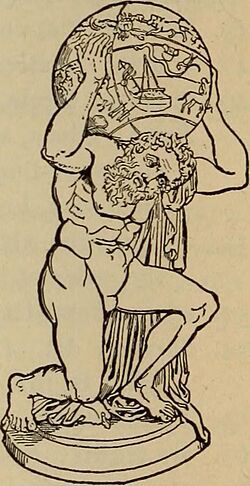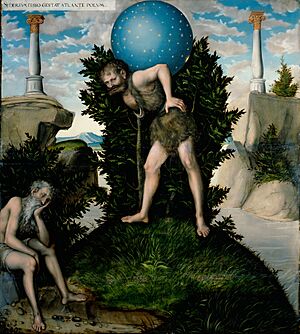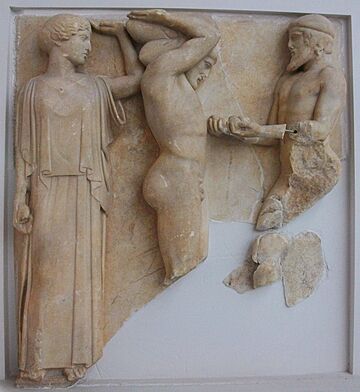Atlas (mythology) facts for kids
Quick facts for kids Atlas |
|
|---|---|

Atlas holds up the celestial sphere, in Naples.
|
|
| Abode | Western edge of Gaia (Earth), Mauretania. |
| Personal information | |
| Consort |
|
| Children |
|
| Parents |
|
Atlas is a famous figure from Greek mythology. He was a powerful Titan. After a great war, he was given a special punishment. He had to hold up the sky forever. You might also know him from stories with Heracles (also called Hercules) and Perseus.
Ancient Greek writers said Atlas stood at the far western edge of the world. Over time, people connected him with the Atlas Mountains in North Africa. Some stories even say he was the first king of a land called Mauretania. Atlas was also known for being very smart. He was skilled in philosophy, mathematics, and astronomy. People in ancient times believed he invented the first celestial globe. He was even sometimes credited with inventing astronomy itself!
Atlas was the son of the Titan Iapetus. His mother was an Oceanid named Asia or Clymene. He had brothers, Epimetheus and Prometheus. Atlas had many children, mostly daughters. These included the Hesperides, the Hyades, and the Pleiades. The nymph Calypso was also his daughter.
The word "atlas" for a book of maps comes from this Titan. A mapmaker named Gerardus Mercator used Atlas's name for his collection of maps. The "Atlantic Ocean" also gets its name from Atlas, meaning "Sea of Atlas." Even the legendary island of Atlantis is named after him.
Contents
The Name Atlas
The exact meaning of the name Atlas is not fully known. Some ancient writers, like Virgil, thought it meant "hard" or "enduring." This makes sense because Atlas had to endure a heavy burden.
Another idea is that the name comes from the Berber languages of North Africa. In these languages, a word similar to "Atlas" means "mountain." This could be because Atlas is linked to the Atlas Mountains.
Atlas in Mythology
The Great War and Atlas's Punishment
Atlas and his brother Menoetius fought alongside the other Titans in a huge war. This war was against the younger gods, the Olympians. It was called the Titanomachy.
When the Titans lost the war, many were sent to a dark prison called Tartarus. But Zeus, the king of the gods, gave Atlas a different punishment. Atlas had to stand at the western edge of the world. His job was to hold up the sky on his shoulders forever. This is why he was sometimes called Atlas Telamon, meaning "enduring Atlas."
It's a common mistake to think Atlas held up the Earth. But in ancient art, he is always shown holding the celestial spheres. These are like a model of the stars and planets, not the actual planet Earth.
Atlas Meets Perseus
The hero Perseus once met Atlas. In some stories, Atlas was a shepherd. In others, he was a king of Mauretania. Perseus, who was a son of Zeus, asked Atlas for a place to stay.
Atlas had heard a prophecy. It warned that a son of Zeus would steal golden apples from his special garden. Because of this, Atlas refused to help Perseus. Perseus then used the head of the Medusa to turn Atlas into stone. In some versions, Atlas became an entire mountain range. His head became the peak, his shoulders became ridges, and his hair became forests.
It's interesting that the prophecy was actually about Heracles, another son of Zeus, not Perseus.
Atlas and Heracles

One of the Twelve Labors of the hero Heracles was to get golden apples. These special apples grew in Hera's garden. Atlas's daughters, the Hesperides, cared for them. A dragon named Ladon guarded the apples.
Heracles found Atlas and asked for help. He offered to hold up the sky for Atlas. In return, Atlas would go get the golden apples from his daughters.
Atlas returned with the apples. But he tried to trick Heracles! Atlas offered to deliver the apples himself. He hoped Heracles would be stuck holding the sky forever. Heracles suspected the trick. He pretended to agree. He only asked Atlas to hold the sky for a few minutes. Heracles said he needed to adjust his cloak for comfort. When Atlas took the sky back, Heracles quickly grabbed the apples and left.
Some stories say Heracles built two huge Pillars of Hercules. These pillars held the sky away from the Earth. This freed Atlas from his heavy burden.
Other Famous Figures Named Atlas

The Titan Atlas is the most famous. But other characters in myths also shared his name.
The King of Atlantis
According to the philosopher Plato, the first king of the legendary island of Atlantis was also named Atlas. This Atlas was a son of the sea god Poseidon. His mother was a mortal woman named Cleito.
The King of Mauretania
Atlas was also a legendary king of Mauretania. This ancient land is now part of modern Morocco. In the 16th century, Gerardus Mercator created the first collection of maps called an "Atlas." He dedicated his book to this King of Mauretania. Over time, Atlas became strongly linked to the Atlas Mountains in Northwest Africa.
Atlas's Family
Atlas had many children, mostly daughters. Their mothers were different goddesses.
- By Hesperis:
- The Hesperides
- By Pleione (or Aethra):
- The Hyades
- A son, Hyas
- The Pleiades
- By other goddesses:
Atlas's Influence in Culture
Maps and Geography
Atlas is most famous for his connection to cartography, the art of making maps. The first person to connect the Titan Atlas with maps was Gerardus Mercator. In the 16th century, he named his book of maps "Atlas." He did this to honor the Titan Atlas, who was known as a wise king, mathematician, and astronomer.
Atlas in Art
Early Greek art shows Atlas standing stiffly. This represents the heavy burden of his punishment from Zeus. Artists often show Atlas as a strong figure holding a celestial globe. This shows the Greek idea of suffering that comes from pride and rebellion. These artworks help us understand how Titans were seen as symbols of divine punishment and cosmic order.
Images for kids
-
Atlas supports the terrestrial globe on a building in Collins Street, Melbourne, Australia.
-
Sculpture of Atlas, Praza do Toural, Santiago de Compostela
-
Lee Lawrie's colossal bronze Atlas, Rockefeller Center, New York
-
Atlas inside the Royal Palace, Amsterdam, Netherlands
-
Statues of Atlas on the exterior of Catherine Palace in Tsarskoye Selo, Pushkin, Saint Petersburg
Family tree
| Atlas's family tree | |||||||||||||||||||||||||||||||||||||||||||||||||||||||||||||||||||||||||||||||||||||||||||||||||||||||||||||||||||||||||||||||||||||||||||||||||||||||||||||||||||||||||||||||||||||||||||||||||||||||||||||||||||||||||||||||||||||||||||||||||||||||||||||||||||||||||||||||||||||||||||||||||||||||||||||||||||||||||||||||||||||||||||||||||||||||||||||||||||||||||||||||||||||||||||||||||||||||||||||||||||||||||||||||||||||||||||||||||||||||||||||||||||||||||||||||||||||||||||||||||||||||||||||||||||||||||||||||||||||||||||||||||||||||||||||||||||||||||||||||||||||||||||||||||||||||||||||||||||||||||||||||||||||||||||||||||||||||||||||||||||||||||||||||||||||||||||||||||||||||||||||||||||||||||||||||||||||||||||||||||||||||||||||||||||||||||||||||||||||||||||||||||||||||||||||||||||||||||||||||||||||||||||||||||||||||||||||||||||||||||||||||||||||||||||||||||||||||||||||||||||||||||||||||||||||||||||||||||||||||||||||||||||||||||||||||||||||||||||||||||||||||||||||||||||||||||||||||||||||||
|---|---|---|---|---|---|---|---|---|---|---|---|---|---|---|---|---|---|---|---|---|---|---|---|---|---|---|---|---|---|---|---|---|---|---|---|---|---|---|---|---|---|---|---|---|---|---|---|---|---|---|---|---|---|---|---|---|---|---|---|---|---|---|---|---|---|---|---|---|---|---|---|---|---|---|---|---|---|---|---|---|---|---|---|---|---|---|---|---|---|---|---|---|---|---|---|---|---|---|---|---|---|---|---|---|---|---|---|---|---|---|---|---|---|---|---|---|---|---|---|---|---|---|---|---|---|---|---|---|---|---|---|---|---|---|---|---|---|---|---|---|---|---|---|---|---|---|---|---|---|---|---|---|---|---|---|---|---|---|---|---|---|---|---|---|---|---|---|---|---|---|---|---|---|---|---|---|---|---|---|---|---|---|---|---|---|---|---|---|---|---|---|---|---|---|---|---|---|---|---|---|---|---|---|---|---|---|---|---|---|---|---|---|---|---|---|---|---|---|---|---|---|---|---|---|---|---|---|---|---|---|---|---|---|---|---|---|---|---|---|---|---|---|---|---|---|---|---|---|---|---|---|---|---|---|---|---|---|---|---|---|---|---|---|---|---|---|---|---|---|---|---|---|---|---|---|---|---|---|---|---|---|---|---|---|---|---|---|---|---|---|---|---|---|---|---|---|---|---|---|---|---|---|---|---|---|---|---|---|---|---|---|---|---|---|---|---|---|---|---|---|---|---|---|---|---|---|---|---|---|---|---|---|---|---|---|---|---|---|---|---|---|---|---|---|---|---|---|---|---|---|---|---|---|---|---|---|---|---|---|---|---|---|---|---|---|---|---|---|---|---|---|---|---|---|---|---|---|---|---|---|---|---|---|---|---|---|---|---|---|---|---|---|---|---|---|---|---|---|---|---|---|---|---|---|---|---|---|---|---|---|---|---|---|---|---|---|---|---|---|---|---|---|---|---|---|---|---|---|---|---|---|---|---|---|---|---|---|---|---|---|---|---|---|---|---|---|---|---|---|---|---|---|---|---|---|---|---|---|---|---|---|---|---|---|---|---|---|---|---|---|---|---|---|---|---|---|---|---|---|---|---|---|---|---|---|---|---|---|---|---|---|---|---|---|---|---|---|---|---|---|---|---|---|---|---|---|---|---|---|---|---|---|---|---|---|---|---|---|---|---|---|---|---|---|---|---|---|---|---|---|---|---|---|---|---|---|---|---|---|---|---|---|---|---|---|---|---|---|---|---|---|---|---|---|---|---|---|---|---|---|---|---|---|---|---|---|---|---|---|---|---|---|---|---|---|---|---|---|---|---|---|---|---|---|---|---|---|---|---|---|---|---|---|---|---|---|---|---|---|---|---|---|---|---|---|---|---|---|---|---|---|---|---|---|---|---|---|---|---|---|---|---|---|---|---|---|---|---|---|---|---|---|---|---|---|---|---|---|---|---|---|---|---|---|---|---|---|---|---|---|---|---|---|---|---|---|---|---|---|---|---|---|---|---|---|---|---|---|---|---|---|---|---|---|---|---|---|---|---|---|---|---|---|---|---|---|---|---|---|---|---|---|---|---|---|---|---|---|---|---|---|---|---|---|---|---|---|---|---|---|---|---|---|---|---|---|---|---|---|---|---|---|---|---|---|---|---|---|---|---|---|---|---|---|---|---|---|---|---|---|---|---|---|---|---|---|---|---|---|---|---|---|---|---|---|---|---|---|---|---|---|---|---|---|---|---|---|---|---|---|---|---|---|---|---|---|---|---|---|---|---|---|---|---|---|---|---|---|---|---|---|---|---|---|---|---|---|---|---|---|---|---|---|---|---|---|---|---|---|---|---|---|---|---|---|---|---|---|---|---|---|---|---|---|---|---|---|---|---|---|---|---|---|---|---|---|---|---|---|---|---|---|---|---|---|---|---|---|---|---|---|---|---|---|---|---|---|---|---|---|---|---|---|---|---|---|---|---|---|---|---|---|---|---|---|---|---|---|---|---|---|---|---|---|---|---|---|---|---|---|---|---|---|---|---|---|---|---|---|---|---|---|---|---|---|---|---|---|---|---|---|---|---|---|---|---|---|---|---|---|---|---|---|---|---|---|---|---|---|---|---|---|---|---|---|---|---|---|---|---|---|---|---|---|---|---|---|---|---|---|---|---|---|---|---|---|---|---|---|---|---|---|---|---|---|---|---|---|---|---|---|---|---|---|---|---|---|---|---|---|---|---|---|---|---|---|---|---|---|---|---|---|---|---|---|---|---|---|---|
|
|||||||||||||||||||||||||||||||||||||||||||||||||||||||||||||||||||||||||||||||||||||||||||||||||||||||||||||||||||||||||||||||||||||||||||||||||||||||||||||||||||||||||||||||||||||||||||||||||||||||||||||||||||||||||||||||||||||||||||||||||||||||||||||||||||||||||||||||||||||||||||||||||||||||||||||||||||||||||||||||||||||||||||||||||||||||||||||||||||||||||||||||||||||||||||||||||||||||||||||||||||||||||||||||||||||||||||||||||||||||||||||||||||||||||||||||||||||||||||||||||||||||||||||||||||||||||||||||||||||||||||||||||||||||||||||||||||||||||||||||||||||||||||||||||||||||||||||||||||||||||||||||||||||||||||||||||||||||||||||||||||||||||||||||||||||||||||||||||||||||||||||||||||||||||||||||||||||||||||||||||||||||||||||||||||||||||||||||||||||||||||||||||||||||||||||||||||||||||||||||||||||||||||||||||||||||||||||||||||||||||||||||||||||||||||||||||||||||||||||||||||||||||||||||||||||||||||||||||||||||||||||||||||||||||||||||||||||||||||||||||||||||||||||||||||||||||||||||||||||||
See also
 In Spanish: Atlas (mitología) para niños
In Spanish: Atlas (mitología) para niños
- Atlas (architecture)
- Bahamut, a rough analogue from Arabian mythology, and other members of Category:World-bearing animals
- Farnese Atlas
- Upelluri
- Nut (goddess), in ancient Egyptian mythology forced to hold up the sky
 | Valerie Thomas |
 | Frederick McKinley Jones |
 | George Edward Alcorn Jr. |
 | Thomas Mensah |








